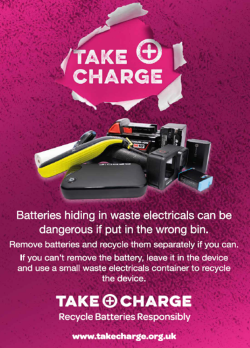Did you know in just one year, between 2019 and 2020, nearly 260 significant battery fires were recorded in recycling and waste facilities across the UK – causing more than £100 million worth of damage! This compromises vital public services, causes millions of pounds worth of damage and puts people at risk of serious injury, or worse. The majority of these fires are caused by batteries which have been improperly discarded and which are subsequently hidden in the general rubbish or mixed with other recyclable materials.
Why Batteries Catch Fire
The hidden batteries are likely to be damaged during the collection and treatment process and some batteries, particularly those that are lithium-ion, can explode or ignite when this happens. These batteries contain flammable electrolytes, and any damage to their structure can cause a short circuit, leading to overheating and potentially igniting a fire.
>> Click here to watch a video about why batteries can be so dangerous: https://youtu.be/1Q_HxpiDMl4
Incidents in Waste Management Facilities
When batteries are thrown away with regular household waste they often end up in waste management facilities. Here, they can be crushed or punctured by heavy machinery, increasing the risk of a fire. Such fires are not only dangerous but also difficult to control, posing a threat to workers and the facility itself. At our Rugby Cement Plant, Climafuel, a waste derived fuel which is made using household residual and commercial waste, is being used to heat the cement kilns. This waste comes directly from the neighbouring Suez waste facility and therefore fires caused by batteries, could have a direct impact on our business.
Household Fire Risks
Improperly disposed batteries can also cause fires in household bins. If a battery is damaged or comes into contact with metal objects, it can short-circuit and ignite. This risk is particularly high for lithium-ion batteries, which are commonly used in many household devices.
To prevent battery-related fires, it is essential to dispose of batteries properly. Here are some key steps:
- Dispose Safely: Many communities offer battery recycling programs and designated drop-off points. These facilities are equipped to handle batteries safely and prevent fires. Fortunately, everyone in the United Kingdom has access to free and convenient battery recycling services Click here to find a battery recycling service near you.
- Store Batteries Safely: Before disposal, store batteries in a cool, dry place, away from flammable materials.
- Avoid Damaging Batteries: Handle batteries with care to avoid puncturing or crushing them. Damaged batteries should be disposed of immediately at a designated recycling facility.
When batteries are recycled responsibly, they are collected, only alongside other batteries, in safe containers. They are then collected securely and taken to facilities which specialise in safe battery sorting and recycling. By rounding up used batteries like this, we can prevent them from damaging normal waste and recycling facilities that are not designed to deal with them.
The fire hazards associated with improper battery disposal are significant but preventable. By following proper disposal methods and utilizing recycling programs, we can reduce the risk of fires and ensure a safer environment. Always remember to handle batteries with care and dispose of them responsibly to protect your home and community from potential fire hazards.
